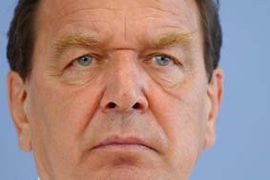Schrder Gerhard Horoscope

Schrder Gerhard
Apr 7, 1944
Rating : AA (Data from a birth certificate)
Virgo
Moon Sign
Pisces
Sun Sign
Libra
Lagan
 Events
Events
Social : End a program of study 1959 (Quit school to work)
Work : New Job 1962 (Became an apprentice salesman)
Relationship : Marriage October 1997 (Fourth wife Doris) chart Placidus Equal_H.
Work : New Job 27 September 1998 (Elected Chancellor) chart Placidus Equal_H.
 Biography
Biography
German politician, a Social Democrat elected Chancellor on 9/27/1998, defeating Helmut Kohl and ending a 16-year era in Germany. After a hard fought campaign, the victory was decisive. With the exit of Kohl, the last of the European politicians who were in office when the Berlin Wall came down in 1989 has departed, reflecting the new priorities that confront Europe today. Along with Tony Blair in England and Lionel Jospin in France, Schroder will confront a central issue; how to adjust Germanys expansive welfare system to global competition without dismantling it, and at the same time, create jobs. Born in poverty, Schroder lost a father he never knew in WW II and survived a hard childhood with his mother working as a cleaner to support the family. He quit school at 14 to work; at 17, he was an apprentice salesman. He studied nights and eventually put himself through law school in Gottingen and began to practice. He entered into politics on the leftist wave of the 60s. With an outlook that evolved toward pragmatism, he fought this campaign on an often vague platform of modernization and renewal under the slogan of "the New Middle." He was the youngest state governor in 1969 and the youngest Party National Chairman in 1973. His wife, Doris, is a reporter whom he met in 1995 when she was covering a Party congress. Two years later she moved to Hanover and in October 1997, a few weeks after Schroder had divorced his third wife, they married. Working together as a power couple, Doris is called an advisor to her husbands campaign. Schroder married his first wife during his student years in law school. He and his second wife were Young Socialists, and his third wife, Hiltrud, shared his premier days in Lower Saxony; they were together for 13 years. Her causes were vegetarianism and gay rights; his had to do with keeping Volkswagen and its 80,000 workers happy. It was a show that she played well, joking about being called "Hillary," and referring to Schroders political career in the plural possessive. When she discovered his affair with Doris, she threw him out of the house and wrote a book, "On My Feet," with less than complimentary reference to him. His last two wives shared an extreme, slender chic, and it was remarked that now, with Doris, he may have "nice, calm dinners with a cheerful wife." Link to Wikipedia biography Read less
 Latest Info with AI
Latest Info with AI
Update at: Jul 17, 2025
Gerhard Schröder
Born: April 7, 1944, in Blomberg, Germany
Overview
Gerhard Schröder is a German lawyer and former politician who served as the Chancellor of Germany from 1998 to 2005. A member of the Social Democratic Party (SPD), his chancellorship was marked by a focus on economic reforms known as Agenda 2010, aimed at modernizing the German economy and addressing unemployment. These reforms, while credited by some with improving Germany's economic competitiveness, also sparked considerable controversy and internal dissent within the SPD.
Post-Chancellorship
Following his time as Chancellor, Schröder's career took a controversial turn with his involvement in the Russian energy sector. He has held various positions with Russian state-owned energy companies, including Rosneft and Nord Stream, drawing criticism for his close ties to Vladimir Putin and perceived conflicts of interest. These ties became particularly contentious in light of Russia's invasion of Ukraine in 2022, leading to calls for sanctions against him and the removal of honorary citizenship and other accolades. The SPD even initiated proceedings to expel him from the party, though this attempt ultimately failed.
News and Recent Developments (as of late 2023)
Recent news surrounding Gerhard Schröder has largely focused on his continued connections to Russia and the resulting fallout. He remains a controversial figure in German politics and public life, facing ongoing criticism for his refusal to distance himself from Vladimir Putin and his role in Russian energy projects. Media coverage often centers on discussions of potential sanctions, legal battles, and his public statements defending his stance.
Social Media Presence
Information regarding Gerhard Schröder's official social media presence is limited. While he may maintain accounts on certain platforms, they are not readily apparent or widely publicized. Much of the discussion and news surrounding him occurs on platforms like Twitter and in online news publications, often initiated by journalists, politicians, and other public figures.
Other Information
Gerhard Schröder's legacy is complex and contested. While remembered for his economic reforms as Chancellor, his post-political career has been overshadowed by his association with Russia. This association continues to be a subject of debate and scrutiny, shaping his public image and influencing discussions about ethics, political influence, and international relations.
Disclaimer: Information provided here is based on publicly available information and may not be exhaustive or fully up-to-date. It is recommended to consult reputable news sources for the latest developments.
```